Three Chimneys Farm Communications Director Jen Roytz is like a racehorse who possesses the magical combination of talent at both distance and sprint races.
In her world of marketing for one of the premiere racehorse breeding farms in the United States, she deftly navigates between her many duties, which include promoting the farm, its star stallions and their progeny, and stepping up, time and time again, to help horse advocates rescue ex-racehorses who fall through the cracks.
And she has fun along the way.
When it looked like Kentucky Derby winner I’ll Have Another, the son of Three Chimneys stallion Flower Alley, was headed for Triple Crown glory, Roytz painted her toenails purple—the shade of the great horse’s racing silks—and through Facebook, convinced a whole lot of women and even men, to do the same!
In this week’s Clubhouse Q&A, Roytz talks about her role at Three Chimneys Farm, and its growing commitment to help ex-racehorse Thoroughbreds land softly. She also discusses her aspirations and background that led her to a career at the center of bluegrass Horse Country.
Q: As communications director for Three Chimneys Farm, what are your top duties and responsibilities?
My main responsibilities are to oversee the brand management and communications for the farm. I handle all advertising, PR, social media, media relations, website, marketing and fan engagement.
The main revenue generator for a farm like Three Chimneys is the stallion roster, so from a marketing perspective, each stallion is like his own company under the umbrella of our over-arching brand. Sales consignment (both in the U. S. and in Europe) and boarding/mare management are secondary revenue generators, so at various times of the year and in key placements, we promote those assets as well through things like paid advertising, direct mail/promotional mailings, eMarketing and social media marketing.
Outside of my role as marketing director, I also help with client relations, especially with those clients who are equestrians or the more horse-loving type (I’ve got a little bit of “horse crazy girl” in me). I can relate well to people whose main driver for being in the industry is not gambling, business, or competition related, but rather that intrinsic love of the horse.
My other role (and the one that I’m the most passionate about) is overseeing all aftercare efforts for Three Chimneys Farm.
I handle the placement of Three Chimneys horses when their racing days (or sometimes their breeding days) are over and I assist many of our clients with this as well.
I also handle dealing with the rescue situations involving Three Chimneys-connected horses, making sure that if any horse connected to the farm ends up in an at-risk situation (a kill pen at an auction, a situation involving neglect, etc.) that we act swiftly to facilitate getting the horse into a safe and productive long term situation.
Q: You write regular features on ex-racehorse Thoroughbreds, which are published in The Paulick Report, and enjoyed by all who read them! What is the genesis of these feature stories, and the goal?
Thanks for the compliment on the column! Writing those stories is one of my favorite parts of my week. The column came about when Brad Cummings (of the Paulick Report) and I were talking over lunch about what productive careers Thoroughbreds can go onto after their racing careers are over.
I talked about how those stories get the most clicks and likes when we post them on the Three Chimneys social media, and that I constantly hear about so many stories about OTTBs that are cool and unique, but since they aren’t Three Chimneys-related, at that time I had no way of featuring them.
That conversation morphed into a “wouldn’t it be neat if there were a weekly column on the Paulick Report site about horses like that,” so everyday owners and breeders who aren’t keyed into the performance horse side of the industry could see not only the many possible second careers for ex-racehorses, but so they could also see examples of how those horses made the transition from racehorse to former-racehorse.
Since it’s both my personal and professional passion, I offered to write it.
With each story I try to not only talk about the horse’s former racing life and current vocation, but also what the owners (both past and present) did to provide a viable option for that horse at the end of its racing career.
Hopefully it helps trainers, owners, breeders, and equestrians learn about the many things they can do to help an OTTB that is or was at one time in their care, or that maybe they have had their eye on for some time.
Q: On the Three Chimneys Farm website, a page titled Protecting Our Own is prominently featured. Pleases tell me about the mission of this page in building awareness of OTTBs.
Three Chimneys has long been an advocate for the Thoroughbred, not just as a racer or breeder, but also as an athlete. Thoroughbred aftercare has become a hot-button topic in recent years, so for that reason we decided to make public our protocol for assisting with horses currently or previously affiliated with the farm when their careers at the track come to an end, or if their life after the track takes a turn for the worse.
For racetrack retirees, we let them down and, if necessary, rehabilitate them here at the farm and then adopt them out to approved homes.
For broodmares, if they retire at a young enough age that they can still have a viable career as a riding horse (and, just as importantly, that they would enjoy a career as a riding horse), we start them schooling under saddle and adopt them out.
For those horses who retire with an injury from the track that prevents them from being a viable riding horse, or for mares or stallions who retire as seniors, we retire them here at the farm so they can live out their days simply being a horse with their buddies.
With the power of communication and information sharing that social media provides, we’ve been able to develop quite a strong and dependable network of equine advocates who assist with equine rescue situations nationally.
These people know that when they come across a Three Chimneys-connected horse who is in an adverse situation, they can contact us and we’ll assist.
Each situation is different and we typically don’t make the specific details of the horse rescue efforts we assist with public for a variety of reasons, but I can tell you firsthand (because it’s usually me as the contact person) that we act quickly and decisively.
These situations rarely present the luxury of time and they typically happen well outside of a typical 8-5 workday – when a horse’s life is potentially at stake, minutes matter, and we act accordingly.
Q: What is your background with horses and with marketing, and how did they come together at Three Chimneys Farm?
I grew up in Cleveland, Ohio riding hunter/jumpers and being obsessed with horses in general.
I used to watch the replays from Thistledown racetrack every night (because, hey, they were horses and I loved horses), and one day my dad took my sister and I to watch morning workouts at the track.
I was hooked.
I began walking hots for a trainer by the name of Joe Shuman when I was 14 or so, and besides keeping me out of trouble, he taught me a ton about handling racehorses, doing legwork, and conditioning and caring for an equine athlete.
That eventually led to me learning how to gallop racehorses at a farm in Cleveland and starting young horses for both racing and performance disciplines.
I came to Kentucky for college with aspirations of being a jockey.
While I galloped at the track every morning before school and rode breeze sets on the weekends, I’m 5’8”, so the jockey career was a pipedream.
I ended up graduating from college with a degree in communications with a focus in advertising and public relations. I landed a job at a Lexington-based marketing firm and was working on the marketing for some horse farms, some non-equine accounts (healthcare, education, etc.) and later was named Director of Public Relations and focused on, among other things, Keeneland’s public relations.
The combination of my communications degrees (I’ve got the Communications undergrad, plus a Marketing Masters) with my hands-on experience in the racing industry and my business experience in marketing within the breeding industry brought me to Three Chimneys.
The previous marketing director, who really helped to build the farm into an internationally recognized and respected brand, decided to retire after nearly 20 years and I was lucky enough to be offered the position.
I’ve been at Three Chimneys for about five years and I absolutely love it – it’s my dream job.
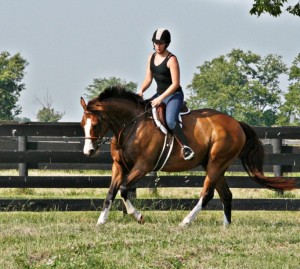
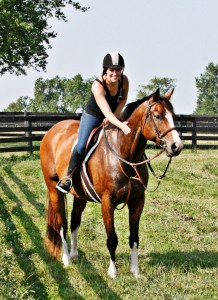
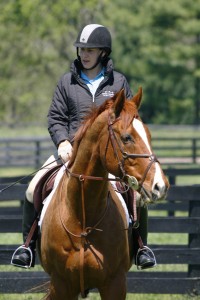
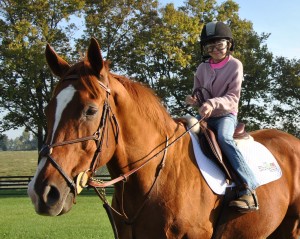
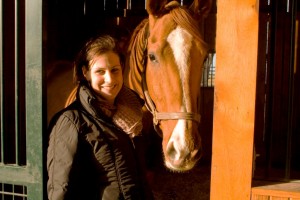

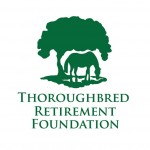
I have gotten to know Jen through breeding my mare to Three Chimneys stallions and she is truly unique. Her ability to marshal people and resources to save a thoroughbred’s life is unparalleled. She does care, she does love them, and we need more Jens.
Keep running, Jen…you carry many good horses with you. Thank you for loving and recognizing the lifelong value of these great equine athletes.
Excellent article. Three Chimneys is a class organization, and Jen does such a fine job with their PR and marketing. She and they set the industry standard for after-racing care for their thoroughbreds.
Great article. I had the pleasure of meeting Jen at Three Chimneys this year. I wont argue that she has THE BEST JOB. Thank you for all that you do for the horses. You really make a difference in so many ways.
Jen you are such a wonderful person and a great advocate for the horses. It is an honor to know you and so reassuring that there are people out there like you who care so much about the horses.
Just wanted to say thank you SO MUCH to Susan for featuring me – WHAT AN HONOR! Also, thank you to all of you guys for the wonderful and very flattering comments. I absolutely love what I do and am so thankful that I can be involved with helping retired racehorses via my position at Three Chimneys. I’m the luckiest person I know! If I can ever be of help to anyone, hit me up!
Jen,
Thank YOU for doing all this! I loved hearing about your beginnings and aspirations to become a jockey! Looking back on it, I wish I’d elected to try to become a jockey myself, instead of a “disc” jockey, which I never did past college.
It’s an inspiration, what you do for the horses.
and all that just scratches the surface!
Ann Banks, I know. It’s pretty difficult to sum up someone and everything they do. But, this is a glimpse inside the breeding farms, and it shows good people trying hard for horses. So that’s something. 🙂
Another reminder of why I LOVE Three Chimneys!
I’m competing a wonderful 7 year old,Lil Albert, out of Three Chimneys. I’m 13 and will be taking him Training Level in the spring and hope to make the young riders team in a couple of years on Albert. Thank you Jen!
excellent. Jen is a great asset to the industry. Interesting she got her start from Joe Shuman, presume the same trainer at Fair Hill!
Alex Brown! Always an honor when you stop by the blog. And yes, Jen is someone who should be cloned and commissioned to represent the horse industry, on so many levels.
ohhh…and Joe Shuman is the father of Mark Shuman at Fair Hill (though I think Joe has a few horses in training on and off up there). Mark is a bit older than me, and I think I used to annoy the heck out of him when I was a kid. He’s a great guy, and definitely a great conditioner of Thoroughbreds, thanks in part to his dad.
Wonderful interview, thank you! Wish every farm cared like Three Chimneys and Jen…
Great interview- Jen is an inspiration to us all!
Sarah,
Thanks! She’s an amazing spokesperson for the Thoroughbred and of the best-practices of “today’s” racehorse farms, in my opinion!